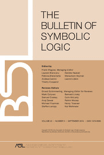
BULLETIN OF SYMBOLIC LOGIC
Scope & Guideline
Unraveling the Mysteries of Logic and Reasoning
Introduction
Aims and Scopes
- Mathematical Logic:
The journal publishes papers that explore the foundations of mathematical logic, including set theory, model theory, and proof theory, often addressing fundamental questions about logical systems and their properties. - Computability and Complexity:
Research on computability theory, including aspects of proof complexity, is a significant focus. This includes studies on complexity classes, computational models, and the implications of these theories on broader mathematical contexts. - Applications of Logic:
The journal highlights constructive applications of logic in various areas, such as algebra, topology, and computer science, showcasing how logical principles can be applied to solve practical problems. - Philosophical Logic:
Papers addressing philosophical implications of logical principles and theories are prevalent, contributing to discussions on the nature of logic, truth, and reasoning. - Interdisciplinary Approaches:
The journal encourages interdisciplinary research that connects logic with other fields, including computer science, linguistics, and cognitive science, reflecting the evolving nature of logic in contemporary research.
Trending and Emerging
- Advanced Proof Theory:
Recent publications emphasize advanced topics in proof theory, including proof complexity and its implications for computational logic. This trend indicates a growing interest in understanding the efficiency and limitations of logical proofs. - Constructive Mathematics:
There is an increasing number of papers exploring constructive approaches to mathematics, reflecting a broader acceptance and interest in constructive logic and its applications in various mathematical frameworks. - Interactions with Computer Science:
The intersection of logic and computer science is gaining prominence, with papers addressing topics like algorithmic logic, computational models, and applications in artificial intelligence, indicating a trend towards practical applications of logical theories. - Model Theory and Its Applications:
Model theory continues to be a strong focus, with increasing publications on interpretability and categorization within weak first-order theories, highlighting its relevance in both theoretical and applied contexts. - Philosophical Implications of Logic:
There is a noticeable trend towards exploring the philosophical dimensions of logic, particularly regarding intuitionistic logic and the axioms of choice, suggesting a deepening inquiry into the foundational aspects of logical systems.
Declining or Waning
- Historical Perspectives on Logic:
Papers that delve into historical analyses of logical systems and figures seem to be declining. The journal has shifted towards more contemporary and applied aspects of logic rather than historical explorations. - Basic Set Theory:
Research that primarily focuses on foundational aspects of set theory, without significant ties to computability or applications, appears to be waning. The trend indicates a preference for more complex interactions between set theory and other areas such as model theory or computability. - Elementary Proofs and Techniques:
The publication of papers emphasizing elementary techniques in logic and proof systems has decreased, suggesting a move towards more sophisticated and intricate methodologies in current research. - Traditional Modal Logic:
While modal logic remains relevant, the focus on traditional modal logic without innovative extensions or connections to other fields is less prominent, indicating a shift towards more modern interpretations and applications.
Similar Journals
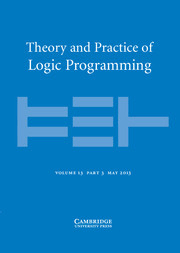
THEORY AND PRACTICE OF LOGIC PROGRAMMING
Exploring Innovations in Computational Theory.THEORY AND PRACTICE OF LOGIC PROGRAMMING, published by Cambridge University Press, is a premier academic journal that delves into the evolving field of logic programming, offering insights and advancements from 2001 to 2024. With an ISSN of 1471-0684 and an E-ISSN of 1475-3081, this journal serves as a vital resource for researchers, professionals, and students interested in areas such as artificial intelligence, computational theory, and software development. In 2023, the journal was recognized for its excellence, achieving Q1 status in Computational Theory and Mathematics and Q2 in several other categories, underscoring its significant impact within the academic community. Despite not being open access, its robust content, curated by esteemed scholars, guarantees high-quality research and innovative methodologies that are crucial for advancing the field. The journal's rigorous peer-review process and its standings in Scopus rankings further emphasize its relevance and authority, making it a quintessential platform for disseminating key findings and fostering scholarly dialogue.

Logical Methods in Computer Science
Empowering discoveries at the intersection of logic and computation.Logical Methods in Computer Science is a premier Open Access journal dedicated to fostering scholarly dialogue within the realms of Computer Science and Theoretical Computer Science. Established in 2004 and published by LOGICAL METHODS COMPUTER SCIENCE E V in Germany, this journal aims to bridge theoretical frameworks and practical applications, providing a platform for innovative research and discoveries. With an impressive HIndex reflecting its commitment to high-quality research, Logical Methods in Computer Science has achieved a Q2 ranking in both the miscellaneous and theoretical categories of computer science, indicating its growing influence in the academic community. Researchers, professionals, and students are encouraged to access and engage with the wealth of knowledge this journal offers, which is freely accessible to facilitate widespread dissemination of cutting-edge advancements in logical methods. With its convergence period extending from 2005 to 2024, Logical Methods in Computer Science continues to be a vital resource for those looking to explore the intersections of logic, computation, and mathematics.

Studia Logica
Charting New Territories in Logic and ScienceStudia Logica is a leading international journal published by Springer that focuses on the intricate interconnections between logic, philosophy, and the history of science. Established in 1953, this journal has garnered an esteemed reputation, consistently appearing in the Q1 category for History and Philosophy of Science and Q2 for Logic in 2023. With a robust Scopus ranking, where it stands at #42 out of 223 in the field of Arts and Humanities and #17 out of 41 in Mathematics (Logic), Studia Logica is pivotal for researchers and scholars keen on exploring the foundations and implications of logical theory and its applications. The journal does not follow an open access model, ensuring that the published work maintains a high standard of quality and rigor. Located in Dordrecht, Netherlands, the journal continues to be a crucial conduit for advancing scholarly discourse and disseminating cutting-edge research in its respective fields.
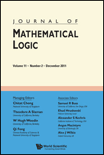
Journal of Mathematical Logic
Pioneering Insights in Mathematical LogicJournal of Mathematical Logic, published by World Scientific Publishing Co Pte Ltd, stands as a premier platform for the dissemination of cutting-edge research in the field of logic, with a notable Q1 ranking in the category of Logic for 2023. Catering to an international audience of researchers, professionals, and students, this journal serves as a vital resource for the latest advancements and theoretical developments in mathematical logic. Spanning from 2007 to 2024, the journal emphasizes contributions that explore both foundational and applied aspects of logic, thereby appealing to a diverse readership. Although currently subscribed access only, the journal’s rigorous peer-review process ensures high-quality publications that enrich the academic discourse within the mathematical community. With its strategic location in Singapore, the Journal of Mathematical Logic not only contributes to the global conversation in mathematics but also fosters collaboration among scholars from various backgrounds.

International Journal of Fuzzy Logic and Intelligent Systems
Advancing the Frontiers of Fuzzy Logic and IntelligenceInternational Journal of Fuzzy Logic and Intelligent Systems, ISSN: 1598-2645, is a prestigious journal published by the Korean Institute of Intelligent Systems, dedicated to advancing the fields of Artificial Intelligence, Computational Theory and Mathematics, Computer Science Applications, Logic, and Signal Processing. Established to foster interdisciplinary research, this journal has quickly established its reputation, reaching a respectable Q3 quartile ranking across multiple categories in 2023. It serves as a vital resource for researchers, professionals, and students, offering insights into cutting-edge methodologies and innovative applications of fuzzy logic and intelligent systems. With a focus on disseminating high-quality research, the journal attracts contributions that drive the evolution of intelligent technologies and their practical implications. Published from South Korea, the journal is positioned to impact the global community, facilitating a deeper understanding of intelligent systems in various domains.
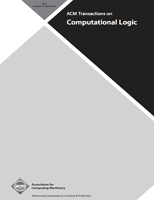
ACM Transactions on Computational Logic
Advancing the Frontiers of Computational LogicACM Transactions on Computational Logic, published by the Association for Computing Machinery, is a premier journal dedicated to the advancement of computational logic, spanning the disciplines of computer science and mathematics. With its ISSN 1529-3785 and E-ISSN 1557-945X, this journal has established itself as a vital resource within the academic community, particularly noted for its influential contributions reflected in its 2023 scopus rankings. The journal holds notable quartile rankings, achieving Q1 in the fields of Computer Science (miscellaneous) and Logic, alongside Q2 in Computational Mathematics and Theoretical Computer Science, indicating its prestigious position in the respective categories. Researchers, practitioners, and students can access a wealth of rigorous research articles that delve into both theoretical frameworks and practical applications of computational logic, fostering innovation and collaboration in the field. As it converges towards its 2024 objectives, ACM Transactions on Computational Logic continues to uphold a commitment to excellence and impact, striving to shape the future of computational theories and methodologies.

JOURNAL OF AUTOMATED REASONING
Exploring the Intersection of AI and LogicJOURNAL OF AUTOMATED REASONING is a premier academic journal published by SPRINGER, focusing on the dynamic and evolving fields of Artificial Intelligence, Computational Theory and Mathematics, and Software. With an ISSN of 0168-7433 and E-ISSN 1573-0670, this journal ranks impressively in the second quartile (Q2) across multiple categories, reflecting its significant contribution to the advancement of knowledge in automated reasoning methodologies. Since its inception in 1985, it has served as a vital platform for researchers and professionals to share groundbreaking findings and innovative techniques, facilitating the exploration of algorithms, logical frameworks, and reasoning processes that underpin artificial intelligence systems. Although it does not currently offer Open Access options, it remains a highly regarded resource, cited widely in academia, with its impactful publications reflecting deep insights and rigorous scholarly standards. The journal’s esteemed status and its ongoing commitment to fostering a greater understanding of automated reasoning make it an invaluable asset for those dedicated to pushing the boundaries of these interdisciplinary fields.

Moscow University Mathematics Bulletin
Celebrating Creativity and Rigor in Mathematical SciencesMoscow University Mathematics Bulletin is a distinguished academic journal published by Springer International Publishing AG, focusing on the dynamic field of mathematics. With an ISSN of 0027-1322 and an E-ISSN of 1934-8444, this journal serves as a platform for innovative research and developments in various mathematics sub-disciplines, making significant contributions to both theoretical and applied mathematics. While it holds a Q3 ranking in the field of Mathematics (miscellaneous) for 2023, this journal remains dedicated to fostering academic discourse among mathematicians. Researchers, professionals, and students will find value in the diverse range of articles that embody rigor and creativity. Although currently not an Open Access publication, the journal provides numerous access options through institutional or personal subscriptions. From its inception in 2007 to its expected continuity until 2024, the Moscow University Mathematics Bulletin is committed to enhancing the understanding and appreciation of mathematical sciences.
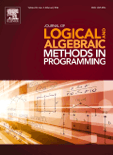
Journal of Logical and Algebraic Methods in Programming
Bridging Theory and Practice in Computational Mathematics.The Journal of Logical and Algebraic Methods in Programming (ISSN: 2352-2208, E-ISSN: 2352-2216) is a prestigious publication by Elsevier Science Inc, dedicated to advancing the fields of computational theory, programming logic, and mathematical methodologies. Esteemed in its commitment to high-quality research, this journal holds a Q2 ranking in 2023 for Computational Theory and Mathematics, and is recognized in various other disciplines including Logic and Software Studies. The journal’s open access policy enhances its visibility and accessibility, ensuring that cutting-edge research reaches a wider audience of researchers, professionals, and students. With an impressive convergence timeline from 2014 to 2025, it is a vital resource for those seeking to explore innovative algorithms and their applications in diverse areas of informatics. The Journal of Logical and Algebraic Methods in Programming represents a unique intersection of logic, mathematics, and software, carving a significant place in the scholarly discourse of theoretical computer science.
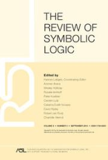
Review of Symbolic Logic
Exploring the Depths of Symbolic ReasoningReview of Symbolic Logic is a prestigious academic journal published by Cambridge University Press, dedicated to advancing the field of logic through critical analysis and innovative research. Established in 2008, the journal has become a key fixture in the academic community, particularly recognized for its contributions in the realms of logic, mathematics (miscellaneous), and philosophy. With an impressive classification of Q1 across multiple categories in 2023, it ranks within the top echelons of its field, standing at 15th out of 41 in Logic and 29th out of 90 in miscellaneous mathematics, positioning itself as essential reading for scholars and practitioners alike. Although not Open Access, the journal offers robust access options through institutional subscriptions, providing an expansive platform for the dissemination of high-quality research. Review of Symbolic Logic aims to foster a deeper understanding of symbolic logic's applications and implications while inspiring emerging scholars and seasoned researchers to further the dialogue within this vibrant area of study.